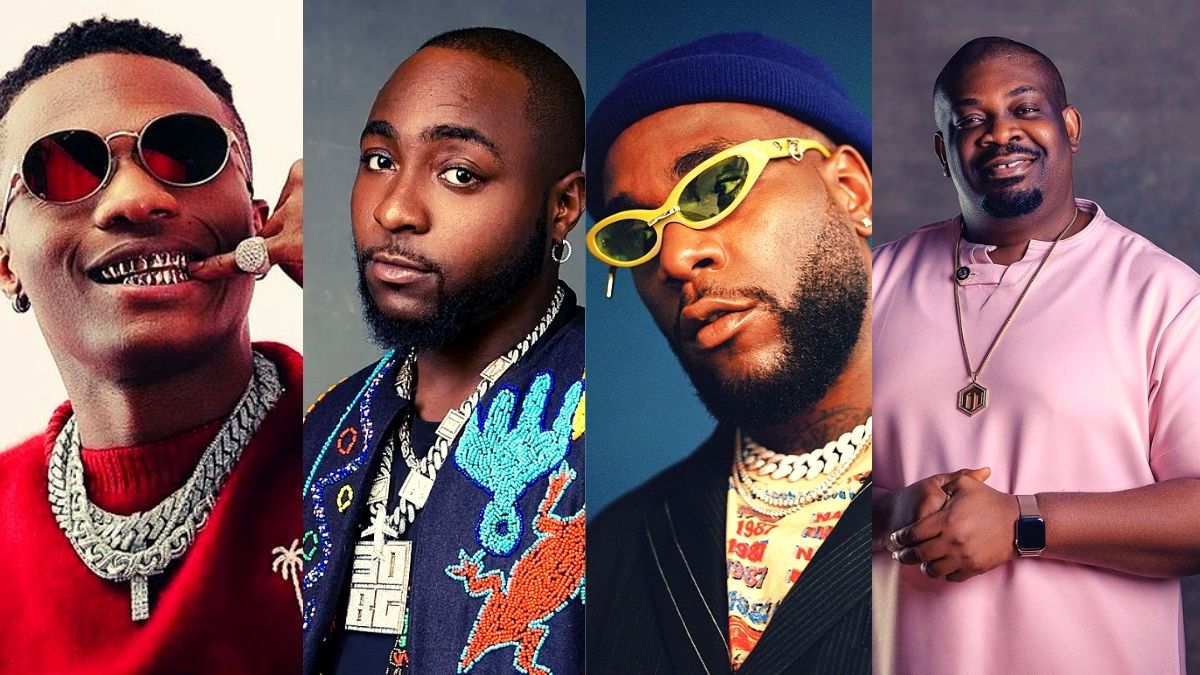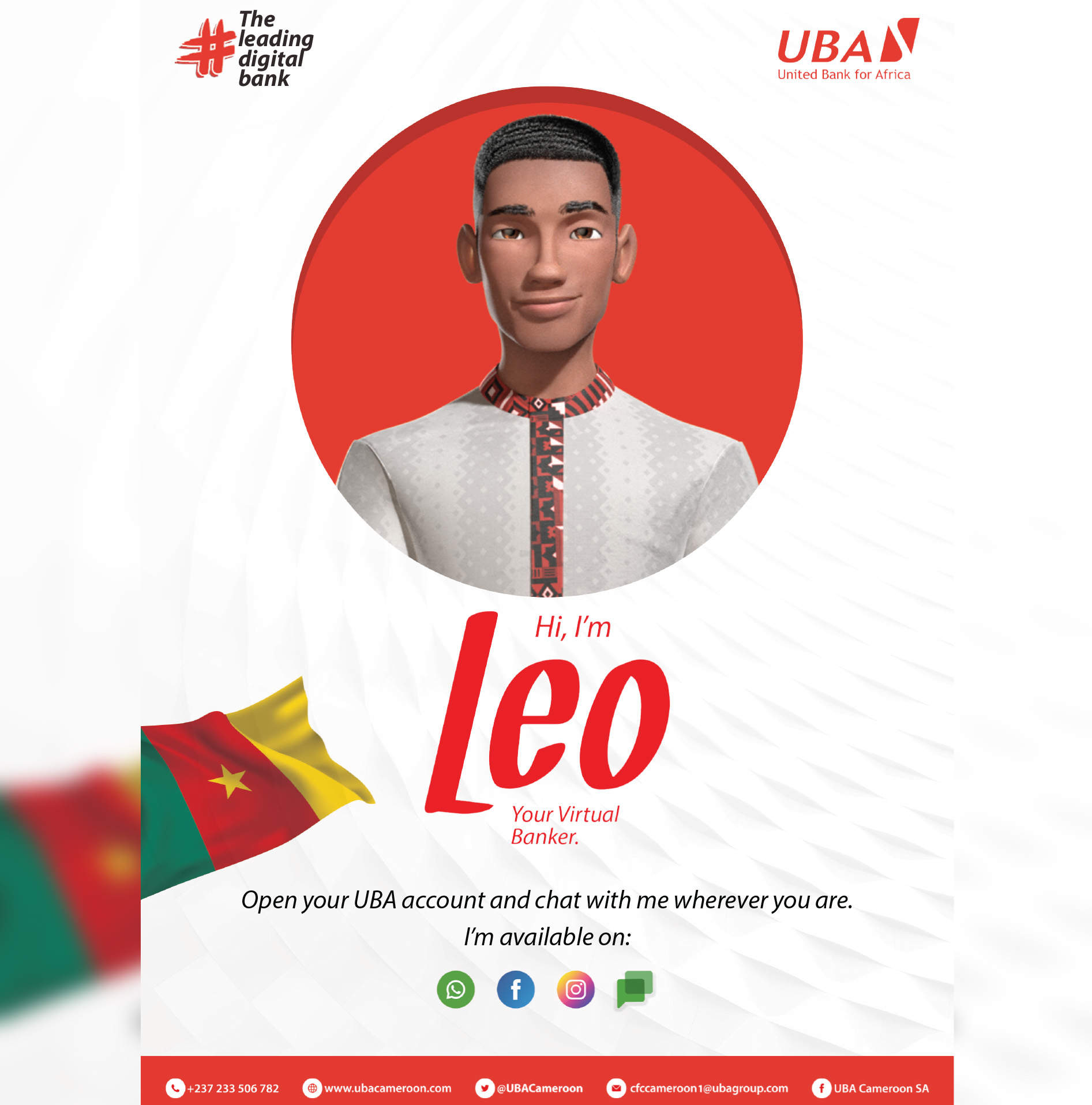2023 was a remarkable year in the entertainment industry. As we step into 2024, we look at the individuals, in no particular order, who are expected to captivate audiences and break boundaries, due to their antecedents this year
Burna Boy
In 2023, the Grammy Award-winning singer, Damini Ogulu, aka Burna Boy, sold out an 80,000-capacity stadium in London, becoming the first African artiste to headline an event in a stadium in the United Kingdom. The concert took place at the West Ham United’s Stadium.
He also bagged four nominations for this year’s Grammys. In 2023, the singer won the Top Afrobeats Artiste award at the 2023 edition of Billboard Music Awards.
Davido
David Adeleke, aka Davido, is one artiste to look out for in 2024. In 2023, the singer got nominated in three categories of the forthcoming 2024 Grammys. The nominations were Best Global Music Album (Timeless), Best Global Music Performance (Feel), and Best African Music Performance (Unavailable).
In the course of the year, a music streaming platform, Boomplay, stated that ‘Timeless’ was the most streamed album in Nigeria on its platform in 2023.
Also, at the 2023 Trace Awards, Davido clinched two awards— ‘Best Male’ and ‘Best Collaboration’.
On a personal note, the ‘Unavailable’ singer and his wife, Chioma, welcomed a set of twins, a boy and a girl, in the United States of America.
There is no doubt that Davido will build on his wins and become even more prominent in the music industry.
Wizkid
Ayodeji Balogun, better known as Wizkid, has continued to garner international recognition and acclaim for his dynamic approach to afrobeats. Over the years, he has shown no signs of slowing down.
This year, he sold out the Tottenham Hotspur stadium, with his ‘More love Less Ego’ concert. With that feat, he became the first African artiste to ever headline a concert at the venue.
Following the release of his EP titled, ‘Soundman 2 (S2)’, the singer set a record for the highest first-day streams on the Spotify daily chart for Nigeria. ‘IDK’, the fourth song off the EP, on which he featured Zlatan, also held the record for the highest first full-day filtered streams on the Spotify Daily Chart for Nigeria, with over 600,000 streams.
Tiwa Savage
Tiwa Savage captured the hearts of music lovers with her melodious voice and infectious lyrics in 2023. Her hit song, ‘Stamina’, on which he featured Ayra Starr and Young John currently has 10 million views on YouTube as of the time of filing this report. Another of her songs released this year, ‘Pick Up’ has 7.5million views on the video sharing platform.
The songstress also did Nigeria proud when she performed at the coronation concert of King Charles III at the Westminster Abbey, England.
Her fans won’t also forget how her sonorous voice graced the remix of Spyro’s hit song, ‘Who is Your Guy’.
Rema
To say that 2023 was Rema’s year of unprecedented success is not an exaggeration. As of the time of filing this report, the video for his hit song, ‘Charm’, has 60 million views. The continued growth of his career was further proven when he sold out the popular 02 Arena in the UK on November 14, 2023.
The ‘Calm down’ crooner also became the first African to perform at the Ballon d’Or Awards, an annual ceremony organised by a French news magazine— France Football— and UEFA to honour the best football players in the world.
Meanwhile, the remix of the singer’s monster hit song, ‘Calm Down’, on which he featured Selena Gomez made history by winning the prestigious first-ever Best Afrobeats award at the 2023 MTV Video Music Awards.
Asake
Call him the ‘King of melody in 2023’ and you will not be wrong. Asake, indeed, had a successful 2023, being one of the most streamed artistes on multiple music streaming platforms.
The self-proclaimed Mr Money bagged multiple nominations in the Headies Awards and secured a win in the ‘Next Rated’, and ‘Album of the Year’ categories.
Similarly, he made history last year by selling out the popular 20,000-capacity O2 Arena. His 2023 album, ‘Work of Art’, was also a fan favourite , topping charts with songs such as ‘Loney at the Top’, ‘Sunshine’, ‘Basquiat’ and ‘Amapaino’.
The singer and his record label boss, Olamide, were also nominated for the 2024 Grammy Awards in the ‘Best African Music Performance’ category.
Funke Akindele
Despite her party, Peoples Democratic Party, being defeated in the 2023 governorship election, where she had contested as the Deputy Governorship candidate, Funke Akindele has remained undeterred. Rather, she has returned to her first love of acting and filmmaking, and has been making some strides.
She released the first season of her Prime Video movie series, ‘She Must be Obeyed’.
Earlier in December, she released a movie titled, ‘A Tribe Called Judah’. As of the time of writing this report, the movie had amassed N400m in box office earnings within the first 12 days of its release.
According to The Cinema Exhibitors Association of Nigeria, the movie has now become the highest grossing movie of 2023.
In the same vein, her 2022 movie, ‘Battle on Buka Street’, became the highest-grossing Nollywood film ever, earning N640m after only nine weeks in the cinemas.
Toyin Abraham
An actress and filmmaker, Toyin Abraham, is another Nollywood diva who make some strides in 2023.
Her movie, ‘Malaika’, had the second highest grossing opening weekend as it made N52million in five days.
Mercy Aigbe
Though she seemed to be missing in action for some time, a popular actress, Mercy Aigbe, ended 2023 on a high note with her movie, ‘Ada Omo Daddy’.
The film, which features top actors, such as Sola Sobowale, Omowumi Dada, Dele Odule, Charles Okafor, Tayo Faniran, Carol King and others, had a premiere, which was the talk of the town for a while. As of the time of filing this report, the film had grossed N30m in its opening weekend.
Kizz Daniel
A singer, Kizz Daniel, has continued to dominate the industry with hit songs. 2023 was not different as some of his songs, including ‘Shu-peru’ and ‘My G’ ruled the airwaves for a while. As of the time of filing this report, ‘Shu-peru’ had 15 million views on YouTube, while ‘My G’ had 7.3 million views within two months of its release.
Days before the end of the year, he released two songs— ‘Twe Twe’ and ‘Too Busy to be Bae’, which are both currently enjoying massive airplay.
Femi Adebayo
Undoubtedly, one of the acclaimed filmmakers of the year, Femi Adebayo showcased his versatility in 2023 with the debut of his movie, ‘Jagun Jagun’, on the movie streaming platform, Netflix.
In the captivating epic fantasy thriller, Adebayo takes on the character of Ogundiji, who feels threatened by an emerging young warrior, Gbotija. The latter’s primary mission is to avenge his father’s death.
Within 48 hours of its release in August, the film had gained significant traction in the United Kingdom and 17other countries, accumulating 2,100,000 views in its initial three days, and reaching 3,700,000 views shortly after. This success positioned it among the top 10 most-watched non-English films globally on Netflix at the time.
Tobi Bakre
Tobi Bakre is one actor that many did not see coming. The former Big Brother Naija housemate showcased his versatility in two compelling roles that left a lasting impression on many fans.
Playing the character of ‘Obalola’ in Jade Osiberu’s ‘Gangs of Lagos’ confirmed to many that he is a good actor.
Subsequently, he took on the role of ‘Edafe Majemijesu Umukoro in Slum King, portraying an unforgiving character seeking retribution for his family’s tragic fate.
His stellar performance in the 2022 film, ‘Brotherhood’, earned him the Best Actor in a Drama (Movie/TV Series) award at the 2023 African Magic Viewers Choice Awards.
Layi Wasabi
A skit maker, Layi Wasabi, wormed his way into the hearts of many with the lawyer character he plays in his skits. In 2023, the skit maker who studied Law at Bowen University gained more fans. He won the Revelation of the Year award at the Nigeria Comedy Awards.
At the 2023 edition of Trendupp Awards, he also won the Emerging Force award.
His talent also caught the attention of an ace comedian, Baskemouth, as the latter featured him on an online comedy series titled, ‘The Slurply Life of Basketmouth and Layi’.
Ayra Starr
Singer, Ayra Starr, was tipped by Saturday Beats to be one of the entertainers to watch out for in 2023, and she lived up to expectations.
The video of her 2023 hit song, ‘Sability’, has 41 million views on YouTube as of the time of compiling this report.
The same song made a former United States of America President Barack Obama’s 2023 summer playlist.
The video of another song of hers, ‘Rhythm and Blues’, currently has 5.2 million views on YouTube.
In 2023, she got a BET Award nomination for Best International Act. She has also been nominated for 2024’s Grammy Awards in the Best African Music Performance category.
Tems
Singer, Tems’ infectious melodies have earned her a special place in the hearts of fans. She is the the first female Nigerian artiste to win a Grammy Award as she won the ‘Best Melodic Rap Performance’ category for her part in ‘Wait for U’, the 2022 hit song by Future featuring Drake.
In 2023, the ‘Crazy Things’ singer was nominated for her contribution as a songwriter on ‘Lift Me Up’, one of the soundtracks on Marvel’s blockbuster movie, ‘Black Panther: Wakanda Forever’.
She was also named as one of the people ‘who achieved peak influence in their fields’ in the 2023 TIME’s Next 100 list, published in September 2023.
She also bagged a Grammys 2024 nomination in the ‘Best Song Written for Visual Media’ category for her role in ‘Lift Me Up’, the hit song by Rihanna.
However, many of her fans, especially on social media, constantly ask the singer to release more songs and be more present in the country.
Bimbo Ademoye
Bimbo Ademoye, known for her charisma and acting talent, is evidently on the rise in Nollywood.
In 2023, she featured in remarkable movies, such as ‘Gangs of Lagos’, ‘Big Love’ and ‘Jagun Jagun’.
She also ventured into producing her own content online, such as ‘Iya Barakat Teropi Secxxion’, ‘Sibe’, ‘Chronicles of a Lagos Girl’, and others.
As a testament to her acting prowess, Ademoye also clinched African Magic Viewers Choice Awards for the ‘Best Actress in a Comedy’ category for her role in the hit series, ‘Selina’.
Odunlade Adekola
Odunlade Adekola’s on-screen presence has solidified his status in Nollywood. His 2023 Yoruba epic movie titled, ‘Orisa’, was the highest-grossing opening film in Nollywood in 2023, and the biggest epic movie opening of the same year.
The actor also won the META Award for his film ‘Orisa’.
Nasboi
Though Nasboi is known more as a skit maker and actor, he showcased his singing talent in 2023 with the song, ‘Umbrella’, on which he featured Wande Coal.
With a well orchestrated social media promotional campaign, involving dance challenges and skits by other content creators, the song spread like wildfire.
The track is currently one of the trending songs in the country.
Shalipoppi
Shallipopi, whose real name is Crown Uzama, gained notable recognition in 2023 with the success of his track, ‘Elon Musk’.
Though many criticised the song, it made it to the pinnacle of the Nigeria Top 100 Apple Music chart. Building on that achievement, he released his debut album titled, ‘Presido La Pluto’, which not only secured the top spot on the TurnTable Top 50 Albums, but also reached the fifth position on the Apple Music Top 100 Albums chart.
He was also one of the most-searched Nigerian artistes of 2023 on Google.
Spyro
Singer, Oludipe David, aka Spyro, is undoubtedly one of the revelations of 2023.
His hit song, ‘Who is your Guy?’ received was chosen by the Lagos State Governor Babajide Sanwo-Olu as his favourite song after he was re-elected for a second term in office. Riding on the wave of the success, Spyro released a remix of the song featuring Tiwa Savage in March 2023. The visuals for the song have amassed an impressive 112 million views on YouTube.
At the AFRIMMA Awards 2023, ‘Who is your Guy?’ won the ‘Best Collaboration’ category. Capitalising on his success, Spyro announced his UK and Europe tour in May 2023, spanning 12 cities in the UK and approximately 20 European cities. He also clinched the Best Collaboration award at the 2023 Headies for the remix of ‘Who is your Guy’.
Sabinus
Chukwuemeka Ejekwu, aka Oga Sabinus, is one of the most sought after content creators in the country.
At the 2023 Rwanda International Movie Awards, Sabinus, who is also an actor, won the African Content Creator Award.
He also had a campus tour, and a UK tour in the course of the year. His film, ‘Sabinus: The Best Man’ was released in 2023 as well.
Josh2funny
A comedian and skit maker, Josh Alfred, aka Josh2funny, was applauded by many when he appeared on the popular international TV reality show, ‘America’s Got Talent’ in 2023.
The video of his appearance on the show currently has 4.1m views on AGT’s official YouTube Channel. Their Twitter page also witnessed heavy traffic as many Nigerians commented on the post showing Josh2Funny.
Odumodublvck
Tochukwu Ojogwu, better known as Odumodublvck, is one of the rappers and singers who ruled the airwaves in 2023 with his hit songs such as, ‘Dog Eat Dog’ ‘Declan Rice’ and ‘Blood on the Dancefloor’.
As of the time of filing this report, the video of ‘Blood on the Dancefloor’ has 4.6m views on YouTube. In January 2023, he ranked number four on TurnTable’s NXT Emerging Top Artistes list. He also clinched the ‘Rookie of the Year’ and ‘Best Rap Single’ categories at the 2023 edition of the Headies.
Portable
Call him one of the most talked about Nigerian entertainers and you won’t be wrong.
In 2023, Habib Okikiola, aka Portable, constantly made headlines; which he capped up with his boxing bout with Charles Okocha. Though Okocha cried foul, Portable won the match, which many believed was staged for entertainment purposes.
As the time of filing this report, his song, ‘I’m not a Prisoner’, which was released after he spent some days in police custody on account of allegedly bullying his former signee, Manny Monie, has 2.6 million views on YouTube.
He also performed at the Nigerian Bar Association’s ‘Unbarred’ concert; as well as at a Celestial church.
Recently, he attended the British Fashion Awards in London, and he was pictured in company with British-Nigerian rapper, Joseph Adenuga, aka Skepta.
Source: Punch



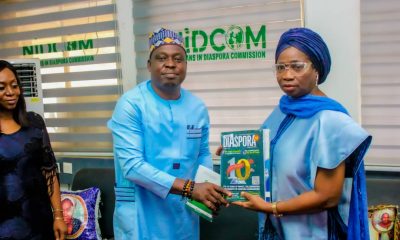

 diplomacy4 semaines ago
diplomacy4 semaines ago
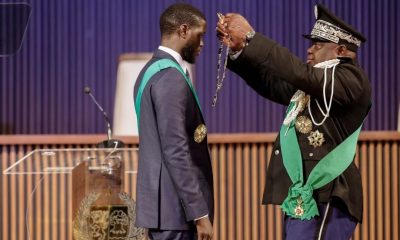

 News3 semaines ago
News3 semaines ago


 News3 semaines ago
News3 semaines ago
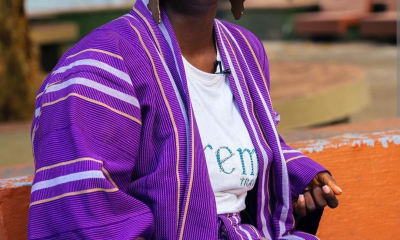

 News2 semaines ago
News2 semaines ago


 Features1 semaine ago
Features1 semaine ago


 Entertainment2 jours ago
Entertainment2 jours ago


